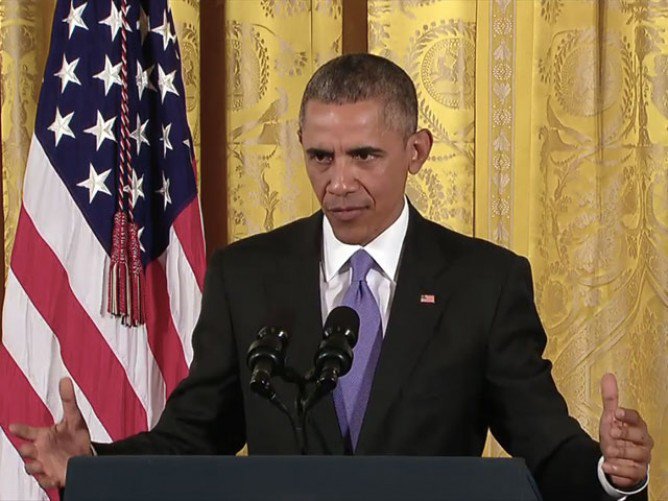By Dana Milbank • Washington Post

President Obama was well into his feisty and freewheeling news conference on the Iran nuclear deal when Major Garrett of CBS News got under the presidential skin.
“As you well know, there are four Americans in Iran, three held on trumped-up charges,” Garrett said. “Can you tell the country, sir, why you are content, with all the fanfare around this deal, to leave the conscience of this nation, the strength of this nation, unaccounted for in relation to these four Americans?”
The normally cool president reacted slowly, as though trying to control his anger.
“The notion that I am content — as I celebrate — with American citizens languishing in Iranian jails?” Obama asked, icily. “That’s nonsense, and you should know better.” After that extraordinary scolding, the president went on to explain that he didn’t link the American captives to nuclear talks because doing so may have made Iran think “we can get additional concessions out of the Americans,” and would have made it “much more difficult for us to walk away” from a deal.
Garrett’s question, though loaded, was legitimate; one of those being held on bogus charges in Iran is Jason Rezaian, The Washington Post’s Tehran bureau chief. And Obama’s answer was revealing: Full of Sturm und Drang, he ultimately acknowledged that the United States just doesn’t have the clout to enforce its will.
This was an undercurrent of the whole news conference Wednesday afternoon, and of Obama’s overall defense of the Iran deal. He was tough and strong, but in service of the argument that American power is limited — that this is the best deal we could get with our declining leverage. His defenders call it realism; it also may amount to ratifying retreat.
Obama took on those who said a better deal would have stripped Iran of all nuclear capability. “The problem with that position is that there is nobody who thinks that Iran would or could ever accept that, and the international community does not take the view that Iran can’t have a peaceful nuclear program,” he said. “And so we don’t have diplomatic leverage.”
As for those who argue for continued economic sanctions? Obama said that sanctions “required the cooperation of countries all around the world, many of whom really want to purchase oil from Iran.” If they saw the United States walking away from a deal, “the sanctions system unravels,” he said, and “we have lost credibility in the eyes of the world.”
He positioned the nuclear deal as the work of a nation trying to triage its problems in global affairs. “The argument,” he said, “that because this deal does not solve all those other problems, that’s an argument for rejecting this deal, defies logic . . . and it loses sight of what was our original number one priority, which is making sure that they don’t have a bomb.”
Broadly, Obama offered his view that “it’s not the job of the president of the United States to solve every problem in the Middle East,” and he said he couldn’t end the Syrian civil war without “buy in” from Russia and Iran. He acknowledged that the nuclear deal might mean more money for Hezbollah, but said, “Is that more important than preventing Iran from getting a nuclear weapon? No.”
Even when the news conference took a brief detour into domestic issues — revoking Bill Cosby’s Presidential Medal of Freedom — Obama spoke of powerlessness. “There is no precedent for revoking a medal,” he said. “We don’t have that mechanism.”
A couple of dozen seats at the news conference were empty, so a smaller-than-usual crowd got to see the rare spectacle of Obama going off script. After finishing his list of pre-selected questioners (and posing a few questions to himself about various objections to the deal), he opened the floor to all comers. “Have we exhausted Iran questions here?” he asked. “I really am enjoying this Iran debate.”
There’s little that Obama’s Republican critics in Congress can do about the deal other than vote their symbolic disapproval, and the president seemed to be speaking as much for the history books as for contemporary critics, using phrases such as “historic chance” and “future generations.” But mostly what came through was a defense of what future historians may describe as the Obama doctrine: an America that recognizes the limits of its power and acts less ambitiously.
“No one suggests that this deal resolves all the threats that Iran poses to its neighbors or the world,” he said, returning repeatedly to the argument that none of his critics has “presented to me or the American people a better alternative.”
He’s right. And this is why it was, sadly, a powerful case — for American weakness.